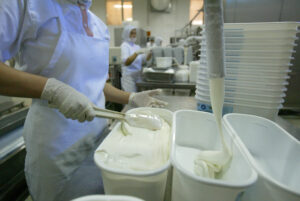A new recall of frozen vegetables was published on August 23, 2023, due to the finding of Listeria monocytogenes in sweet cut corn. Recalled products were distributed to major retailers across the U.S. having best by dates as far away as December 2024. Listeria monocytogenes, like many pathogens, will not be eliminated by freezing and will persist in the frozen product. While little information is given in the recall, findings from a 2016 listeriosis outbreak involving frozen vegetables is highlighted in the following.
In 2016, the first multistate outbreak of L. monocytogenes involving frozen vegetables occurred in the U.S. Initially three persons reported illness in 2016, but six more illnesses occurring between 2013 – 2015 were identified using PulseNet traceback data. Two outbreak strains were identified in patients ranging in age from 56 to 91 years and three deaths were reported.
Routine sample of frozen vegetables, and the use of whole genome sequencing (WGS), revealed that eight illnesses were closely related to a strain found in frozen organic white sweet cut corn and one illness to a strain found in frozen organic petite green peas produced by CRF Frozen Foods of Pasco, WA. At the same time, an investigation of the Oregon Potato Company of Pasco, WA found that environmental samples matched the whole genome sequence associated with the eight clinical cases and the CRF frozen organic white sweet cut corn. However, a connection between the companies is unknown because the FDA is prohibited by law from releasing publicly certain information about supply chains, which may constitute confidential commercial information.
A recent publication describes the investigational findings by federal and state regulatory agencies at the two frozen vegetable manufacturers. Observations at the CRF Frozen Foods’ facility indicated that the materials and design of equipment and utensils did not allow proper cleaning and maintenance, and could be potential sources of contamination. An investigation of the facility did not find L. monocytogenes in the environment, but L. innocua was found in zones 1 – 3 which FDA considers evidence of conditions that would be suitable for L. monocytogenes.
Seven L. monocytogenes positive zone 1 swabs, two positive zone 2 swabs, ten positive zone 3 were found in the Oregon Potato Company’s facility. Two of these positives, one zone 1 swab and one zone 3 swab,- matched an outbreak strain also found in CRF’s frozen organic white sweet cut corn. Inspectional observations made include:
- failure to clean food‐contact surfaces as frequently as necessary to protect against contamination
- facility construction that did not prevent condensate from contaminating food‐contact surfaces
- food‐contact surfaces not adequately cleaned and sanitized
- failure to maintain physical facilities in a sanitary condition
- facility construction not allowing adequate cleaning of floors and walls
A FDA warning letter was issued and noted the presence of L. monocytogenes in the facility as being indicative of inadequate sanitation efforts to effectively control pathogens in the facility. Although these products are considered not ready‐to‐eat, many consumers may use these products
without proper cooking. Cooking instructions should be clear and validated, and consumers should be informed that consuming undercooked or uncooked frozen vegetables could lead to foodborne illness.




